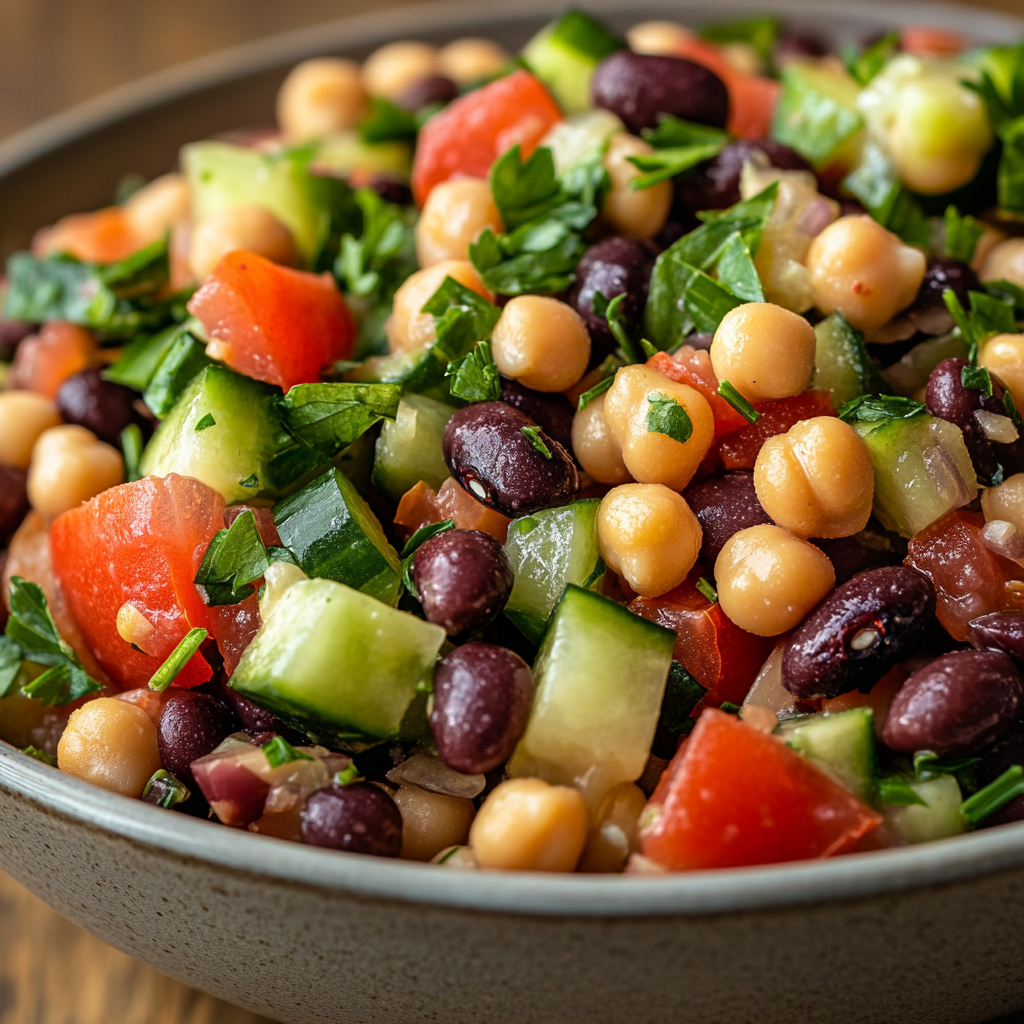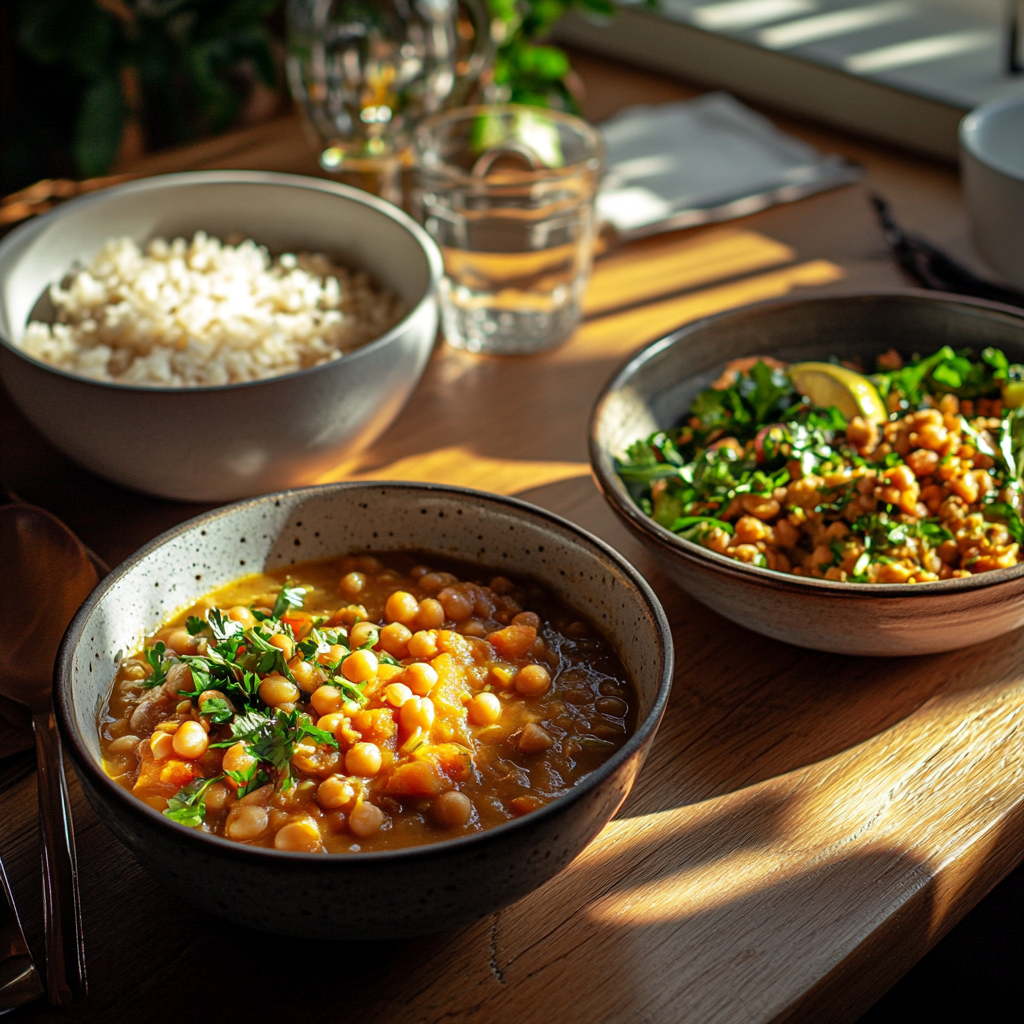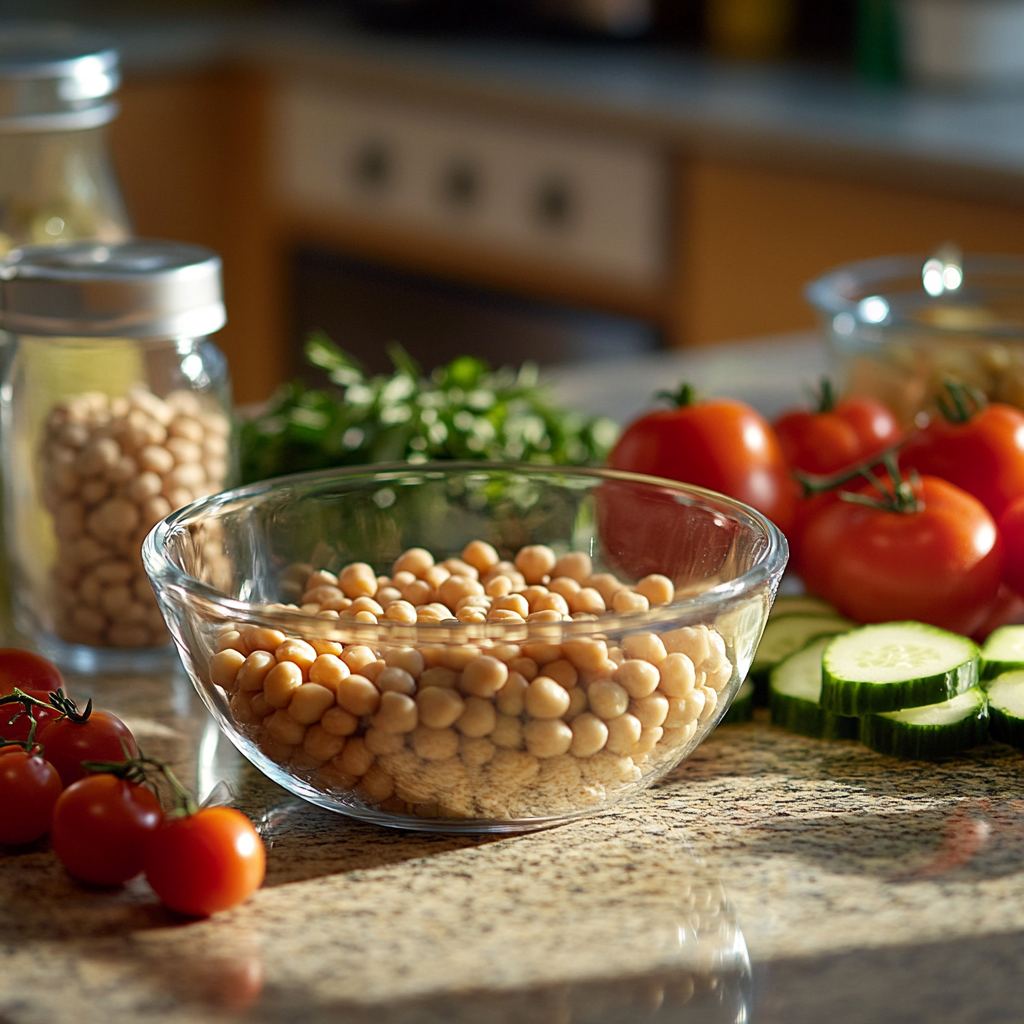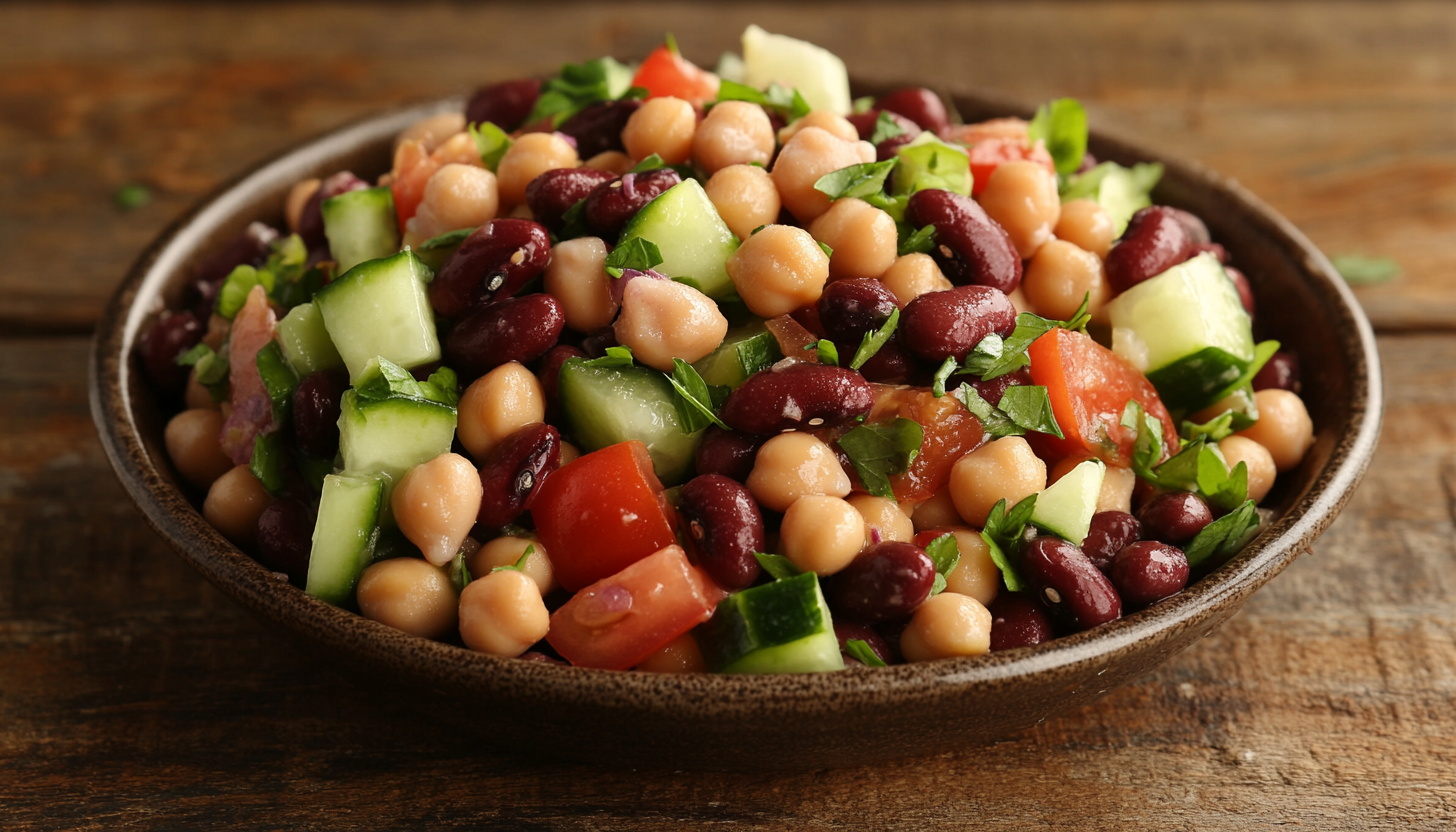Eating bean salad daily has become a popular choice for many health-conscious people. Known for its vibrant mix of beans, vegetables, and delicious dressings, this dish is packed with nutrients. But is it healthy to eat bean salad every day? This article explores the components, benefits, and potential drawbacks to determine if daily consumption is a smart dietary decision.
Key Takeaways
| Benefits | Considerations | Tips |
|---|---|---|
| High in fiber, aiding digestive health | May cause gas or bloating due to fiber content | Soak beans before cooking to reduce discomfort |
| Excellent source of plant-based protein | Contains antinutrients that may affect absorption | Pair with vitamin C-rich foods to enhance nutrient intake |
| Rich in essential vitamins and minerals | Caloric content can be high with added dressings | Use light dressings and monitor portion sizes |
Understanding Bean Salad Components
Common Ingredients in Bean Salad
A classic bean salad usually includes a mix of beans like black beans, chickpeas, kidney beans, and sometimes green beans. These legumes pair with fresh vegetables such as bell peppers, onions, and tomatoes. A tangy dressing made of olive oil, vinegar, and seasonings completes the dish. Each ingredient contributes unique flavors and nutrients, making this dish both delicious and healthy.
This salad is also easy to modify. For example, substituting black beans with edamame or adding grains like quinoa increases the protein content. Such versatility makes it a favorite for those seeking quick, nutrient-rich meals.
Nutritional Profile of Bean Salad

Bean salads are nutritional powerhouses. Beans provide dietary fiber, plant-based protein, and slow-digesting carbohydrates. They also supply vitamins like folate and minerals such as iron and magnesium, which support energy production and overall health.
The nutritional benefits of beans include their low glycemic index, making them ideal for managing blood sugar. Combined with fresh vegetables, the salad becomes a source of antioxidants that protect against cell damage.
Is it healthy to eat bean salad every day? The answer often depends on preparation methods and portion sizes, but the nutritional benefits make it a great option for regular meals.
Health Benefits of Eating Bean Salad Daily
High Fiber Content and Digestive Health
One key benefit of bean salad is its high fiber content. Fiber keeps bowel movements regular, prevents constipation, and supports gut health by feeding beneficial bacteria. Soluble fiber in beans also lowers cholesterol, reducing the risk of heart disease.
Did You Know? A serving of bean salad can provide up to 50% of your daily fiber needs. Cook beans thoroughly to make them easier to digest and reduce potential discomfort.
Plant-Based Protein Source
Beans are an excellent alternative to animal proteins, making them perfect for vegetarian and vegan diets. Protein is essential for muscle maintenance, tissue repair, and enzyme production. Unlike meat, beans contain little saturated fat, promoting heart health.
Pairing beans with grains or nuts creates a complete amino acid profile. This combination boosts the nutritional value of bean salad and makes it both delicious and balanced.
“Plant-based proteins, like those in beans, reduce the risk of chronic conditions such as diabetes and heart disease.”
Rich in Vitamins and Minerals
Beans and vegetables in the salad deliver a variety of essential vitamins and minerals. For example, iron supports oxygen transport in the blood, while magnesium aids muscle and nerve function. Folate is crucial for DNA synthesis and repair, especially during pregnancy.
To enhance nutrient absorption, pair your salad with foods high in vitamin C, such as citrus fruits or bell peppers. This pairing reduces the effects of phytates, which may lower mineral availability in beans.
Is it healthy to eat bean salad every day? Considering its nutrient-packed profile, this dish can be a wholesome addition to your routine when prepared and consumed mindfully.
Potential Risks of Daily Bean Salad Consumption
Digestive Issues from Daily Bean Consumption
Although bean salad offers numerous health benefits, eating it every day can sometimes cause digestive discomfort. Beans are high in fiber and complex carbohydrates, which can be difficult for some people to digest. As a result, symptoms like gas, bloating, and occasional cramps may occur, especially for those unaccustomed to a fiber-rich diet.
To minimize these issues, it’s essential to prepare beans properly. For example, soaking them overnight and cooking them thoroughly can help break down complex carbohydrates that cause digestive distress. Additionally, pairing bean salad with gut-soothing ingredients like ginger or fennel can further ease digestion. Learn more about the side effects of beans to better manage your intake.
Antinutrients in Beans
Beans naturally contain antinutrients such as lectins and phytates, which may interfere with nutrient absorption. These compounds bind to essential minerals like iron and calcium, making it harder for your body to absorb them. While these effects are generally minimal for most people, consuming beans daily without proper preparation could exacerbate nutrient deficiencies over time.
Fortunately, cooking beans reduces the levels of antinutrients significantly. Soaking and sprouting are also effective methods for improving the nutritional quality of beans. Combining your bean salad with foods rich in vitamin C or probiotics further enhances mineral absorption, ensuring a well-rounded diet.
Table: Tips to Reduce Antinutrients in Beans
| Method | How It Helps |
|---|---|
| Soaking Overnight | Breaks down antinutrients and improves digestibility |
| Cooking Thoroughly | Reduces harmful compounds like lectins |
| Sprouting | Enhances the availability of vitamins and minerals |
Caloric Considerations
While bean salads are nutritious, they can become calorie-dense depending on the dressing and additional ingredients. For example, dressings made with oil or mayonnaise, as well as high-calorie toppings like cheese or nuts, can contribute significantly to your daily calorie intake.
To avoid excess calories, opt for lighter dressings made with olive oil and vinegar or low-fat yogurt. Measuring portion sizes and keeping toppings in moderation can also help. Balance your bean salad with other low-calorie side dishes to maintain a healthy caloric intake while still enjoying its benefits.
“By using light dressings and controlling portions, you can enjoy bean salad daily without worrying about calorie overload.”
Preparing Bean Salad for Optimal Health
Proper Cooking Methods
The key to enjoying bean salad every day lies in proper preparation. Cooking beans thoroughly not only improves their flavor and texture but also reduces antinutrients and increases digestibility. Soaking beans for several hours or overnight is an essential step, as it helps break down complex sugars that can cause digestive discomfort.
Pressure cooking is another excellent method, as it preserves nutrients while making beans easier to digest. For those who prefer convenience, canned beans are a good alternative, but rinsing them well can remove excess sodium and any remaining antinutrients.
Ingredient Selection and Variety
Adding variety to your bean salad enhances both its taste and nutritional value. Incorporate a wide range of vegetables such as carrots, cucumbers, and leafy greens. Experiment with herbs like parsley or cilantro for added flavor. Including diverse beans like lentils or cannellini ensures a broader spectrum of nutrients.
Pairing beans with different dressings also keeps meals interesting. For example, a tahini-based dressing adds healthy fats, while a lemon vinaigrette provides a refreshing, low-calorie option. Rotating ingredients prevents monotony and ensures a wider range of dietary benefits.
List: Ingredient Ideas for Bean Salad
- Beans: Black beans, kidney beans, chickpeas, lentils
- Vegetables: Bell peppers, cucumbers, cherry tomatoes, spinach
- Dressings: Olive oil and balsamic, tahini-based, lemon vinaigrette
Portion Control and Frequency
While bean salad is nutritious, consuming it in excessive amounts may lead to imbalances in your diet. A serving of half a cup to one cup is generally sufficient to reap its benefits without overloading on calories or fiber. Adjust portion sizes based on your individual dietary needs and activity levels.
Moreover, while it’s fine to enjoy bean salad frequently, consider alternating it with other dishes like soups or stews that feature legumes. This approach provides variety and prevents any nutrient excesses or deficiencies that could arise from eating the same dish every day.
Is it healthy to eat bean salad every day? With proper preparation, portion control, and ingredient variety, it absolutely can be a consistent and beneficial part of your diet.
Alternatives to Daily Bean Salad
Other Legume-Based Dishes

If you find eating bean salad daily monotonous, consider exploring other legume-based dishes. Lentil soups, for instance, provide a comforting and nutritious option packed with fiber and protein. Chickpea stews, seasoned with a mix of spices, offer another hearty alternative. These dishes maintain the nutritional benefits of beans while providing variety in taste and texture.
Additionally, incorporating legumes into meals like black bean burgers or falafel patties offers a creative way to enjoy their benefits. By rotating these options, you can keep your meals exciting without compromising on health. Is it healthy to eat bean salad every day? The benefits of beans can also be enjoyed through these delicious alternatives, ensuring a diverse and balanced diet.
List: Popular Legume-Based Alternatives
- Lentil soups with vegetables
- Chickpea curry or stew
- Black bean or kidney bean burgers
- Hummus made with chickpeas or white beans
Incorporating Beans Beyond Is It Healthy to Eat Bean Salad Every Day
Rather than sticking solely to salads, try adding beans to a variety of dishes. For example, toss black beans into a breakfast scramble or sprinkle chickpeas over a grain bowl for lunch. Soups, casseroles, and pasta dishes also accommodate legumes beautifully, boosting their nutritional value.
Beans can even be used in unconventional recipes. For instance, mashed black beans can be added to brownie batter for a nutrient-packed dessert. These innovations ensure you still benefit from legumes without relying solely on salads.
Quote: “Adding beans to diverse meals keeps your diet balanced and ensures you enjoy their nutritional perks in exciting new ways.”
Tips for Incorporating Bean Salad into a Balanced Diet
Balancing Macronutrients

Although bean salad is rich in protein and fiber, it may lack sufficient carbohydrates or healthy fats depending on its preparation. To create a balanced meal, consider pairing it with whole grains such as quinoa or brown rice. Adding a small portion of healthy fats, like avocado or olive oil, further boosts its nutritional value.
Maintaining macronutrient balance ensures your energy levels remain stable throughout the day. It also supports overall dietary diversity, which is essential for long-term health.
Complementing with Other Food Groups
To avoid nutrient gaps, combine bean salad with foods from different groups. For example, pair it with lean proteins like grilled chicken or fish to increase variety. Alternatively, serve it alongside roasted vegetables or a small piece of whole-grain bread to create a complete meal.
This approach not only enhances the taste of your meals but also ensures you meet all essential dietary requirements. A well-rounded plate helps maintain a healthy, satisfying diet.
Table: Pairing Ideas for Balanced Meals
| Bean Salad Base | Complementary Side | Added Nutritional Benefit |
|---|---|---|
| Chickpea Salad | Grilled salmon | Boosts omega-3 intake |
| Black Bean Salad | Quinoa | Adds complex carbohydrates and protein |
| Mixed Bean Salad | Roasted sweet potatoes | Increases vitamin A and fiber |
Monitoring Overall Nutrient Intake
Eating bean salad daily requires attention to overall nutrient intake to avoid imbalances. While beans are highly nutritious, over-relying on them may lead to excess fiber, which can cause discomfort, or insufficient intake of other vital nutrients. Regularly rotating your meals and including diverse food groups ensures you meet your dietary needs effectively.
Additionally, staying mindful of portion sizes prevents excessive calorie consumption. Using a food diary or app can help track nutrient intake and ensure your diet remains varied and balanced.
For more insights on the nutritional benefits of beans, visit are beans good for you for expert tips and recipes.
FAQs About Eating Bean Salad Daily
- Can eating bean salad every day cause digestive issues?
Yes, especially if you are not accustomed to high-fiber foods. Start with smaller portions and increase gradually. - How can I reduce gas when consuming beans daily?
Soak beans overnight, cook them thoroughly, and consider pairing them with herbs like fennel or ginger to ease digestion. - Are there any nutritional deficiencies to watch out for?
While beans are nutritious, a diet lacking in variety can lead to deficiencies. Balance your meals with other food groups. - What are the best beans for a daily bean salad?
Chickpeas, black beans, and kidney beans are excellent choices due to their nutrient profiles and versatility. - How can I add variety to my daily bean salad?
Experiment with different vegetables, dressings, and toppings such as seeds or nuts to keep meals exciting.
Final Thoughts on Is It Healthy to Eat Bean Salad Every Day?
Eating bean salad daily can be an excellent way to boost your intake of fiber, protein, and essential nutrients. However, balance is key. To fully enjoy its benefits without potential drawbacks, prepare beans properly, watch portion sizes, and include a variety of other foods in your diet. Moreover, listen to your body and adjust your consumption if you notice any discomfort.
If you’re looking for a dense and flavorful variation of this dish, explore this recipe for a dense bean salad. It provides inspiration for incorporating beans into your meals while ensuring a satisfying and nutritious experience.
Ultimately, a thoughtfully prepared bean salad can be a nutritious and delicious addition to a well-rounded diet. Try incorporating it into your routine today and enjoy the health benefits it brings!

